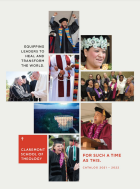The Doctor of Ministry (DMin) in Innovation and Creativity in Ministry is designed for clergy and other spiritual leaders of any tradition, including leaders in transition, to help them develop new models of ministry using the theories and practices of innovation.
What are the admission requirements?
- Completion of MDiv degree or equivalent
- Graduate school GPA of 3.25 on a 4.0 scale is preferred
- Significant ministry experience (typically a minimum of three years)
- For those whose first language is not English, qualifying demonstration of English language competency
To see the full list of admission requirements, please visit the Deadlines & Requirements page.
What are the Curriculum Requirements and Schedule?
Course formats: online and in-person.
The program is grounded in multi-day, in-person intensives each fall. Up to half the degree may be taken online. The degree may be completed in a minimum of 3 years and must be completed within 5 years.
Course Requirements and Schedule
The program consists of 30 credits of course work distributed as follows:
Core Courses – 12 credits (3 courses)
(Meetings during fall intensives, in a cycle of 3 consecutive fall terms)
TSF4046 Spiritual Renewal Through Engaged Compassion (4 credits)
- This course for the Doctor of Ministry Program in Spiritual Renewal, Contemplative Practice and Strategic Leadership teaches contemplative, relational, and socially engaged spiritual practices that cultivate the interpersonal skills necessary for wise, effective, and compassionate leadership in communities, interreligious contexts, organizations, and the world.
*TSF4082 Interspiritual Approaches to Visionary Leadership (3 or 4 credits)
- This hybrid course for the Doctor of Ministry Program in Spiritual Renewal, Contemplative Practice and Strategic Leadership, and the Doctor of Spirituality program and explores the contributions of interspirituality, contemplative practice, and compassion-based social change in support of organizational leadership especially visioning and changemaking. Topics will include grounded and generative approaches to strategic change, inclusive decision-making, team-building, and creating organizational cultures that promote compassion, dignity, empowerment, effectiveness, and personal and social renewal. This course teaches approaches, processes, skills, and sensibilities that combine the best contemplative traditions with the best practices of embodied, holistic, and healing centered leadership.
*TSF40XX Innovation & Creativity in the Church (4 credits)
- This course will provide secular and religious research on innovation and creativity as it relates to the current and future church. It will provide the necessary research background of innovation and creativity. Both theory and practical models will be explored. The class will look at the process of innovation and how creativity can be fostered in individuals and institutions. In addition, the class will look at various models of innovation and creativity in the church. New models, such as the Fresh Expressions movements in both the U.K. and the U.S.A., new church development models, and others will be examined.
Elective Courses – 12 credits (3 courses – 4 credits each)
These courses can be taken as online, hybrid-intensive, or in-person from CST’s regular courses or from any of CST’s cross-registration partner schools.
DMin Project Courses – 6 credits
(Half of which take place in an in-person format):
TDP4060 (1 credit, taken 4 times) 4 credits
TDP40xx* DMin Project 2 credits
(*The Registrar’s Office has not yet assigned a course code to this course. The course code for this course will be updated in a later addendum to this catalog.)
TOTAL: 30 credits
Want to learn more?
Reach out to the Admissions Counselor for this program, Elizabeth Strowbridge, by emailing estrowbridge@cst.edu or by using the below link to submit an inquiry form.



